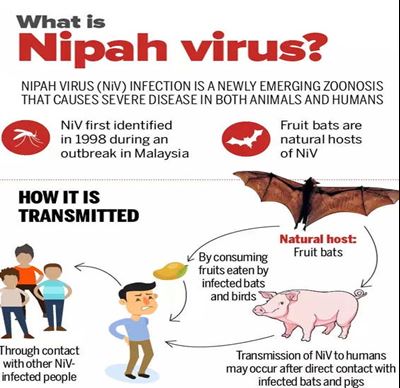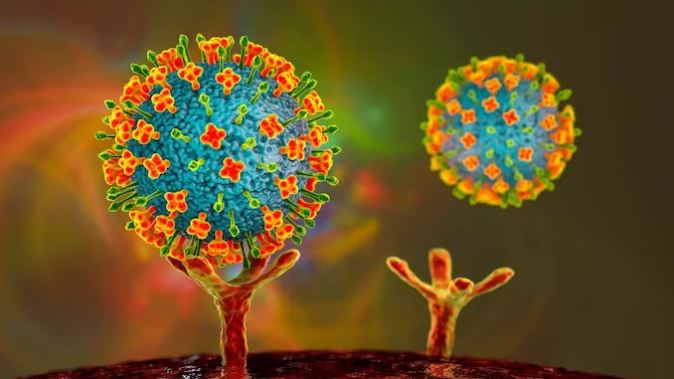Amid increasing cases of the Nipah virus in Kozhikode, Kerala, an order has been issued to keep all educational institutions closed for two days on Thursday, September 14. Two people have died here due to the Nipah virus. A 9-year-old child is in ICU.
According to the news agency PTI, the Nipah virus has also been confirmed in a health worker. With this, so far five cases of Nipah have been reported in Kerala. On Thursday, the Central Health team reached Kozhikode, Kerala. This team will hold a meeting with the district administration regarding the Nipah virus.
On Wednesday, a team from Kozhikode Medical College collected samples of betel nut and guava from Maruthonkara village to test for Nipah virus.
Earlier, Kerala Health Minister Veena George said that the virus that has been confirmed in the state is the Bangladeshi variant. It spreads from human to human. Its mortality rate is high, but it is less contagious.
Nipah virus symptoms
According to WHO, patients infected with the Nipah virus show symptoms like viral fever along with headache, feeling like vomiting, difficulty breathing, and dizziness. The death rate due to the Nipah virus is very high.
Till now there is no treatment or vaccine (injection) available. The zoonotic virus is one which spreads from animals to humans or from humans to animals. If symptoms persist for 1-2 weeks, it is advisable to contact a doctor.

Treatment
There are currently no drugs or vaccines specific for Nipah virus infection although WHO has identified Nipah as a priority disease for the WHO Research and Development Blueprint. Intensive supportive care is recommended to treat severe respiratory and neurologic complications.
Nipah virus alert in Karnataka after Kerala
An alert has also been issued in Dakshina Kannada district of Karnataka. The medical department has directed to test the fruits coming from Kerala in the district. Also asked to make checkposts on the borders to check vehicles. In Mangaluru, patients suspected of having brain fever have been asked to be kept under observation.
7 containment zones created in Kozhikode
The first death due to the Nipah virus in Kozhikode in Kerala occurred on August 30 and the second death occurred on September 11. Four districts of Kerala – Kozhikode, Kannur, Wayanad, and Malappuram are on alert regarding the virus. Wearing masks has been made mandatory in hospitals.
7-gram panchayats here have been made containment zones. Only shops selling medicines and essential goods are allowed to open from 7 am to 5 pm.
The former Health Minister said – the situation is not as bad as in 2018
Former Kerala Health Minister KK Shailaja said that there is no need to panic about the Nipah virus. The situation in Kozhikode is not as bad as it was in 2018. At that time this virus was new to us and we had no experience in dealing with it. Now we have the necessary facilities to stop this.
In 2018, 17 people died due to the Nipah virus in Kozhikode and Malappuram districts of Kerala. Earlier, a case of Nipah virus was reported in Kochi in 2019. At the same time, in 2021 a case of Nipah virus was found in Kozhikode.
Danger of virus spreading in fruits due to bat urine or saliva
According to WHO, the Nipah virus spreads to humans from animals like bats and pigs. Experts believe that this virus can also spread from one infected person to another.
In some old cases in Bangladesh and India, it was seen that the virus spread to fruits also through the urine or saliva of bats. People have become infected by consuming these fruits or products made from them (like juice or toddy).
The first case of Nipah was found in Malaysia 25 years ago.
According to WHO (World Health Organization), the Nipah virus was first detected in Sungai Nipah village, Malaysia in 1998. It was named Nipah after the name of this village. Then the pig-rearing farmers were found infected with this virus.
According to the report of the Malaysia case, cases of infection spread through pets like dogs, cats, goats, and horses were also reported. After Malaysia, this virus was also detected in Singapore in the same year.
After this, in 2001, patients infected with this virus were also found in Bangladesh. After some time, Nipah virus patients started being found around the Indian border with Bangladesh.




